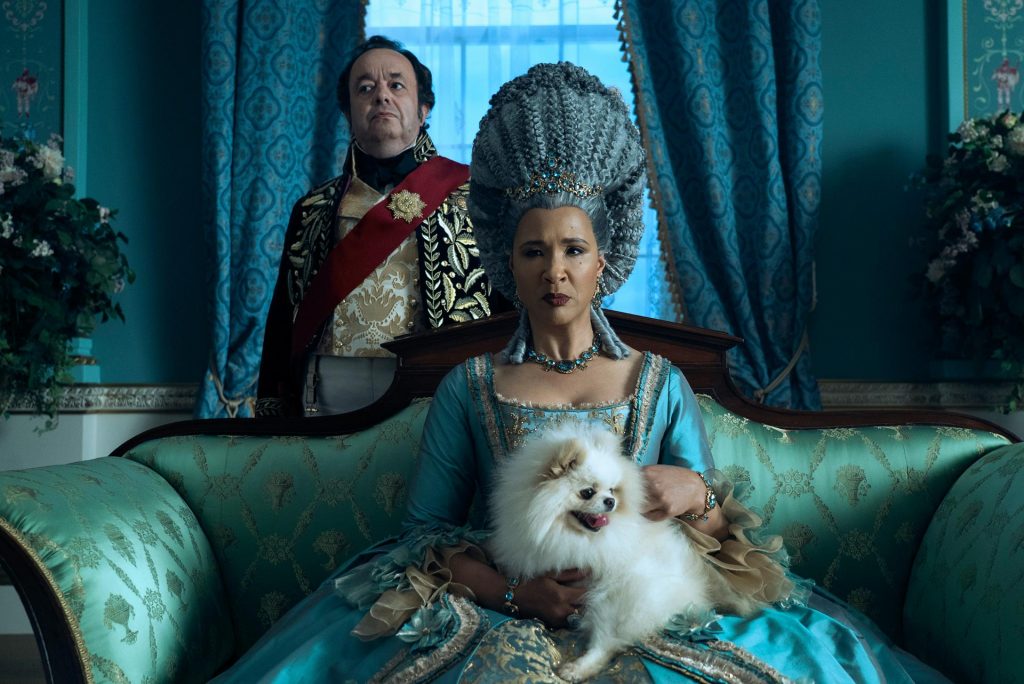She’d originally auditioned for the role of Lady Danbury — and luckily for us, she didn’t get it. Otherwise, we may never have been treated to Guyanese-British actress Golda Rosheuvel’s now iconic Queen Charlotte — with her trademark pout, withering looks of disdain, and meme-worthy lines like “sorrows, sorrows, prayers”.
This is the queen that presides over the Bridgerton universe, you see — a rich, complex breakout character who’s as shrewd, imperious and intolerant of vulnerability as she is loving, loyal, compassionate, and fiery.
Played masterfully by Rosheuvel, it’s no wonder that the first spinoff from the hit regency series — produced for Netflix by prolific writer/producer Shonda Rhimes’ Shondaland — was a prequel series focussed on Queen Charlotte.
The fan favourite is (very) loosely based on Charlotte of Mecklenburg-Strelitz (1744–1818), wife of British monarch King George III. Queen Charlotte: A Bridgerton Story, which premiered last May, explores the queen’s arrival in England and early, beautiful and challenging love story with the king. It’s arguably the best instalment in the franchise.
With the first two Bridgerton seasons and Queen Charlotte all among the top 10 most watched English-language series ever to stream on Netflix (Bridgerton’s third season is set to drop, at press time, in late 2023/early 2024), Rosheuvel has been thrust into the global spotlight since Bridgerton premiered in December 2020.
Many now recognise her for her ground-breaking role as a Black queen of England. But fewer know Roshuevel’s story, or how her journey as a biracial, binational, queer, immigrant actress has become an inspiration for so many around the world.
That journey began on 2 May, 1970 in Georgetown, Guyana, where Golda was born to a Guyanese father — Siegfried Rosheuvel, an Anglican priest — and an English mother, Judith Evans. The couple had met years earlier when Siegfried was in Barbados for a music event (Evans was the niece of the island’s bishop). They married in Bartica, Guyana where his parents lived, before moving frequently though the country — Skeldon, Enmore, Mahaica, and Anna Regina.
“My mum would tell me stories of my dad going with her and me as a babe on my mum’s back … going into the bush for two weeks with the tribes,” Golda told Guyana’s Stabroek News.
When she was five, the family moved to England, living first with her mother’s brother before settling in Hertfordshire and Essex, north of London. She describes it as a “multi-cultural, multi-supportive” household — an upbringing where she retained strong connections to Guyanese uncles, aunts and cousins, and where Guyanese food like pepper-pot, garlic pork, cook-up rice, and chicken curry were as much a fixture as afternoon teas with scones, clotted cream and jam.
It was a nurturing, inclusive, life-affirming home environment, through good times and bad — one she says where “there was always joy and laughter and music and conversation”, and where their home was open to all.
“[My parents] had dear, dear friends who are gay,” she told Out magazine, “and they worked in the community with Indigenous people, with refugees, with gays and lesbians, transgender [people].”
She met nothing but support from her parents when telling them that she was gay. Her brother’s response was simply, “Cool. What do you want for lunch?”
Though involved in the arts from an early age, Rosheuvel’s primary focus for most of her childhood was sports. She captained her netball and hockey teams, swam for her county, was passionate about tennis, and excelled in athletics — especially javelin. She had her eyes on Olympic glory as a decathlete until an ankle injury in her mid-teens took her out of training.
It was only then that the performing arts — music, dance, and acting — took precedence. But it’s an evolution she says made perfect sense. Music in particular had always been part of her life. Her parents had met in a choir, and she too had sung in choirs with her mother (her first public musical performance was Mozart’s Requiem). The family often attended the theatre and opera, and the house was always alive with a variety of musical styles — from classical to jazz to reggae. Her father also played the steelpan.
After secondary school, Rosheuvel went on to study at the London Studio Centre, with her first big break — as Donna in a touring production of Hair — coming while she was still in school. Several more musical theatre roles followed after graduation, including Carmen Jones (the Old Vic Theatre), a British tour of Jesus Christ Superstar (as Mary Magdalene), Porgy & Bess (her West End debut), South Pacific (the National Theatre ), We Will Rock You (the Dominion Theatre), and Fame at the Aldwych.
But while she would never leave music behind, acting work soon predominated. And in between performances of celebrated works at and with prestigious venues and companies — Electra (the Old Vic); Romeo & Juliet (Shakespeare’s Globe); The Curious Incident of the Dog in the Nighttime (the National); Angels in America (Headlong Theatre Company); The Tempest, Julius Caesar and Antony & Cleopatra (Royal Shakespeare Company); and the title role in Othello at Liverpool’s Everyman Theatre in 2018, among others — television and film roles began to come in.
Always intent on developing a well-rounded career in theatre, television, and film, she lined up guest and recurring roles in well-known series like Luther, The Bill, Casualty, EastEnders, Coronation Street, Silent Witness and Torchwood, before landing the role of a lifetime as Queen Charlotte in 2018.
She describes it as one of the easiest castings she’d ever experienced. Having been unsuccessful with the Lady Danbury role, the casting team asked her to submit a self-tape audition for the queen instead. She found 30 minutes to prepare it while packing to go on Christmas holiday — “I just knew her”, she says — and the rest is history.
Not everything along the way was that easy, however, with fallow periods when work — especially interesting work — seemed to dry up. “I’ve definitely tried desperately to do other things because it hasn’t been easy, this journey as an actor … Being frustrated with stuff that was being offered, and wanting to progress a little bit more, I had to look at the industry and work out how the industry saw me,” she explained to Chani Nicholas on an episode of Netflix’s digital series Star Power.
Over the years, she’s also wrestled with questions of identity — both around her ethnicity and whether she needed, professionally, to hide her sexuality. As many of mixed heritage do, she went through periods of wondering whether she was Black enough, especially given that casting agents screened her almost exclusively for Black roles (often Black stereotypes).
The answer for her was to take and integrate what she loved from both sides of her family, creating a sense of wholeness that was completely and uniquely her own. It’s why Queen Charlotte is “an ode to my mum”, she says — the first opportunity she’s had in her career to tap into “that side of me that comes from England, that loves manor houses, afternoon teas, horse-riding, that quintessential English countryside that my mother was passionate about,” she told Caribbean Heritage Magazine.
She also refused to believe that she needed to live anything less than a fully authentic life in order to be successful as a performer. And in her now decade-long relationship with her partner, writer Shireen Mula, she draws inspiration from her parents’ relationship, committing to joy through all life’s ups and downs.
It’s in no small part why she serves as an inspiration for viewers around the world who see themselves in her, or in the characters she plays. There’s a message that she consistently receives from fans: “Thank you, I see myself now — it is possible.”
Before long, for the second time in under a year, Rosheuvel’s face — surveying all from under an elaborate wig that can weigh upwards of 30 pounds — will be beamed to viewers in nearly 100 countries as Bridgerton season three premieres.
“For me, through the medium of storytelling, we can ask or discuss these difficult questions about diversity and representation,” she reflected in an interview with BAFTA. “And I think Bridgerton and Queen Charlotte do it really well by just having us there … showing that we love, we cry, we laugh, we wear beautiful gorgeous clothes, we’re sexy, we love gossip, all of that stuff, celebrated in a really diverse, inclusive platform.”
And what’s next for Golda, as new opportunities follow her recent screen success? She has a couple of film projects coming up for release (and in 2021 had a role in the hit film, Dune). She has dreams of playing Fosca in Stephen Sondheim’s musical, Passion (since music, as ever, is never far from mind). And, perhaps, a return to Guyana — a country she’s not visited since she left as a child.
She hopes to explore the places where her father preached — travelling up the Essequibo, and hiking into the interior. It’s a trip she and her brother, as well as two of their cousins — whose family also emigrated, but who have visited Guyana several times since then — have long talked about. Since her parents’ passing, it’s an urge that has only grown stronger — to learn more about the Guyana her parents lived in and loved, and where her father and his people were from.
In the mean time, she continues to live a life that is wholly and entirely hers, and has good advice for those wanting to follow in her footsteps.
“Your soul, your passion, your gut, your need to be an actress, to be a musician, to be in the arts — whatever that means to you — listen to that,” she says. “Don’t listen to anyone else … It’s inevitable in this industry to have difficult times. But that voice within you that drives your passion, never dull it down. Always give it the energy to speak loud and proud to in your soul. And that will get you through.”

